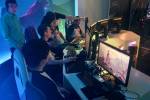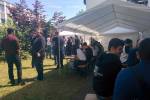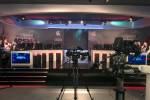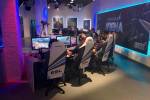Total War: Arena Exclusive Press Event

Last weekend we were invited by Sega to attend an exclusive event, the world presentation of Total War: Arena in Cologne (Germany), the new installment of the Total War series. For those that don't know the game, Total War: Arena is a kind of MOBA (bridging the gap) but much more strategic and tactical. Unlike its predecessors, it will be free-to-play and will focus on delivering 10vs10 PvP battles. The game is currently in its closed alpha (though it seems that it is about to be released) and we had the chance to play it and discover what it has to offer.
After being brought to the ESL offices, we explored the place: they had prepared two sets from where they were going to broadcast several matches by live streaming; we also toured their offices and a room in which guests were invited to play the game for the first time. When all the press and the members of the community arrived to the offices the event began with a brief presentation that showed us the game and the new trailer.
After the presentation, several members of the team (Gabor Beressy, Project Lead; David Petry and Elliot Lock, Game Designers; and Alex DeRosee, Lead Programmer) responded to the questions that both the community and the press gave them. After the Q&A we went to try the game and interview the developers, which we were very interested in (none of us had been able to play it before), so after kidnapping David Petry to guide us we were prepared to enter into Total War: Arena.
The first impression we had of the game is that the game was really advanced to be an Alpha, the second is that we had a lot of options at our disposal. At this point David explained us the basic mechanics of the game; in every battle there are 10 players per side, a total of 20 players (though he told us that they would later integrate 5vs5 battles) that control three independent units of troops (a total of 60 units in each battle) from the Ancient Greece and Roman eras and composed of, more or less, 100 troops each, and each contingent is headed by a general.
We had at our disposal the Roman generals Julius Cesar, Germanicus and Scipio Africanus; and the Greek generals, Leonidas, Alexander the Great, and Miltiades, and although they weren't available at the closed alpha we saw that in the future it would be possible to play with Vercingeritorix and Arminius. Each general possesses its own abilities, and when we play with them they receive experience which can be used to improve their skills or learn new ones; in addition each general possesses a distinct role (like assault/cavalry, defense/heavy or support/enginer), which makes them more effective with certain types of troops or in certain situations. For example, Germanicus is extremely efficient commanding heavy infantry units since he has skills like Charge or Raise Shields which can be used to protect his units from rains of arrows, while Julius Cesar is great supporting the units of the other players and inspiring them, and is especially efficient commanding ranged combat units. On the other hand we have Alexander the Great, who is very useful commanding Cavalry and assaulting enemies, because he can improve his troops temporally with more acceleration, turning and speed, or use high damage charges.
Choosing a general knowing so little about the game was rather difficult, but in the end we decided to take Leonidas, since his defensive role fitted our playstyle. After choosing the general who would lead our troops we had to choose the three units under our command. Although in this battle we only had at our disposal 4 types of different troops (the initial ones) which were Archers, Spearmen, Swordsmen and Javelin Throwers, David told us that in the game we can find about 10 different types of troops, which include units of Cavalry, Artillery, Light Infantry, Heavy Infantry and more. At this point he told us that when you play with a type of troop it gets experience, which can be used to assign them different pieces of gear that make them faster, more lethal or more resistant, and when they get enough experience you can unlock other types of more advanced troops.
Having said this he showed us the game’s tech tree, a huge tree with a very wide variety of troops with different skills, attributes and functions; for example there are different types of archers, some of them are faster, others do more damage but have less reach, others have more reach but are more fragile, and others have more morale.
When we were choosing the type of units David told us that there are certain basic mechanics on the battles: the Lancers are very good against Cavalry, the Cavalry is very good against units of Swordsmen, the Swordsmen are very efficient against the Lancers and the ranged units are very efficient against all kinds of enemies, although they are extremely fragile. Having said that we decided to pick two units of swordsmen (at low levels there is no cavalry) and a unit of archers.
After we decided which units we were going to bring to battle we had to make a few more decisions as each troop type can be equipped with two improvements which can be used in combat, these improvements are "skills" that provide them with buffs. For example, the Militiamen, the most basic infantry, can equip themselves with rations that increase their damage or sharpening stones that enhance their ability to penetrate armor. In our case, as we had selected a defensive general, we equipped our melee troops with a skill that improves their armor and another one that increases the damage of their swords. The archers were equipped with some arrows with more reach but less damage and some arrows with less reach and more damage.
After that we clicked PLAY and... we had to wait a while. As I have already said the game is currently in its Closed Alpha and there are few players, meanwhile David explained the basics of the matches. The objective of each game is to conquer the enemy base or kill all the troops of the opposing team in 15 minutes (this being the maximum round time after which the winner will be decided by points), but typical games can be as short as 6 minutes.
Currently the game has 3 maps: Marathon, a map with various crags and wooded areas perfect for preparing ambushes; Thermopylae where we will be able to recreate the legendary battle of Leonidas and the 300 Spartans, and Salernum, a town surrounded by several villages and forests. On each map the environment affects everything we do, if we go through a wooded area our units will be slower, but enemies can’t see them from outside the forest, if we cross rivers our movement is going to be really slow and we are going to be an easy prey for the enemy attacks, if we attack with archers from cliffs or raised areas they‘ll get huge bonuses, and if we launch a charge on a slope this one is going to be much more lethal.
There are many factors to take into account when we fight, from where you're fighting, positioning your troops so that your flanks are protected or avoiding attacks from ranged weapons to your own engaged melee troops since the game has friendly fire. The truth is that we were a little overwhelmed by the amount of information that we had received for the game, but we have to admit that we were willing to fight for the glory of Greece.
After waiting a few minutes we started the match. The general is assigned to one of three units under your control, and you can control each unit independently. Each unit possesses abilities assigned to different keys and you can activate them when you most need it. Once we took control, we didn’t look at the map and went forward alone... big mistake, since as soon as we moved a little we were ambushed by two infantry units and several units of archers who were waiting for us on a nearby cliff out of our view. In the beginning we managed to hold the position (Leonidas is a very tough general) but soon a couple of units arrived to the battle and flanked our units and while we tried to flee we were killed mercilessly; we only lasted two minutes in the game.
At this point you can decide to stay in the match, or leave and play another one, but you cannot play with the same general that you used in the last match until it ends. After the humiliating defeat of our contingent, we decided to learn how to play from the other players (who despite not having a very high level, since the matchmaking system doesn’t mix players from different levels, were a lot better than us). We saw that the players can give orders directly on the map drawing symbols or arrows, but we also saw one guy who was dedicated to drawing penises... we don’t know what his strategy was. Matches were brutal and the soldiers fell constantly leaving the battlefield full of corpses (one interesting detail is that when you use the zoom to see your soldiers more closely you can see that they are generated randomly, so each one is different to the rest of his unit mates even though they have the same outfit). At the end the opposing team beat ours because they managed to conquer our base. In addition when a match ends you can see a detailed battle report in which you can see your achievements, the experience won by your troops and generals, or the enemies that you've beaten (in our case almost none).
After this first ill-fated match we played a few more and soon we discovered we needed to cooperate with other players, go with caution and follow the orders proposed at the beginning of the match to make the battles more interesting and exciting. The truth is that when you attract an enemy into a trap and put an end to him you feel really accomplished and having three different units that you can control independently allows you to create a lot of different strategies, which may become a lot more complex if you prepare them with other players.
Overall after playing a few games we felt that we had scratched only the surface, and even with that Total War: Arena left us with a very positive feeling. From here we took a break and talked a bit more with David who told us that even though the game looks very advanced, they are still balancing many things, in addition to preparing new maps and game modes he also told us that they are working very closely with the community. All the changes that they make first have to receive the approval of the players and that many of the changes and improvements to the game have been proposed by the players since its main objective is to offer the best possible gaming experience. He also confirm to us that the game will be completely free-to-play and the only things that you can buy in the cash shop are additional colors for our troops, additional skins for the generals, or extra experience for our units, which simply means that players can level up faster.
After that we were invited to eat. In the courtyard of the office they had prepared a German barbecue in which they were cooking sausages, skewers, and lots of meat. After eating and relaxing we had a meeting with Gabor Beressy and Alex DeRosee in which we asked them all the things we wanted to know about the game and its development.
In the afternoon they took us to the sets where we sat down to watch a tournament between the most important and famous members of the game’s community for a 10 vs 10 battle which was broadcasted live through Twitch and in the eSports style of tournaments such as League of Legends and similar games. The tournament pitted two teams (Leonidas and Germanicus) of veteran players and was very interesting to see how before each match they planned all their movements and the strategies that they would use to defeat the other team. The battles were bloody and although the game lacked a spectator mode (the developers told us that this feature is already on their list of things to do), we clearly saw that the game has a lot of potential to become an e-Sport, but currently the developers aims are to make the game as great as possible.
After six hours of fierce battles, the Leonidas team won team Germanicus with a 7-3 victory and at the end of the tournament a gold medal was given to the winners and a silver one on the vanquished.
So it was that the event came to an end, however the developers brought us dinner (even more bratwursts and pizza) and a little later they took us to explore the nightlife in Cologne and were provided with free drinks; in the morning there were only a few of us who didn’t have a hangover!
In conclusion, Total War: Arena is a game with a lot of potential, is very interesting and extremely addictive. Although now we can get a fairly clear idea of how the game will be when it is released officially, there are many things that can be added or improved to make it even better, and the task to balance the different types of troops and generals can be daunting. Despite its complexity the fact remains that Total War: Arena is unique in the market and so we have a hunch that the game will be a great success if the developers continue making improvements and they continue listening the community feedback.
















